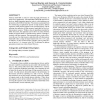Free Online Productivity Tools
i2Speak
i2Symbol
i2OCR
iTex2Img
iWeb2Print
iWeb2Shot
i2Type
iPdf2Split
iPdf2Merge
i2Bopomofo
i2Arabic
i2Style
i2Image
i2PDF
iLatex2Rtf
Sci2ools
128
click to vote
FPGA
2012
ACM
2012
ACM
Optimizing SDRAM bandwidth for custom FPGA loop accelerators
Memory bandwidth is critical to achieving high performance in many FPGA applications. The bandwidth of SDRAM memories is, however, highly dependent upon the order in which addresses are presented on the SDRAM interface. We present an automated tool for constructing an application specific on-chip memory address sequencer which presents requests to the external memory with an ordering that optimizes off-chip memory bandwidth for fixed onchip memory resource. Within a class of algorithms described by affine loop nests, this approach can be shown to reduce both the number of requests made to external memory and the overhead associated with those requests. Data presented shows a trade off between the use of on-chip resources and achievable off-chip memory bandwidth where a range of improvements from 3.6× to 4× gain in efficiency on the external memory interface can be gained at a
| Added | 21 Apr 2012 |
| Updated | 21 Apr 2012 |
| Type | Journal |
| Year | 2012 |
| Where | FPGA |
| Authors | Samuel Bayliss, George A. Constantinides |
Comments (0)

